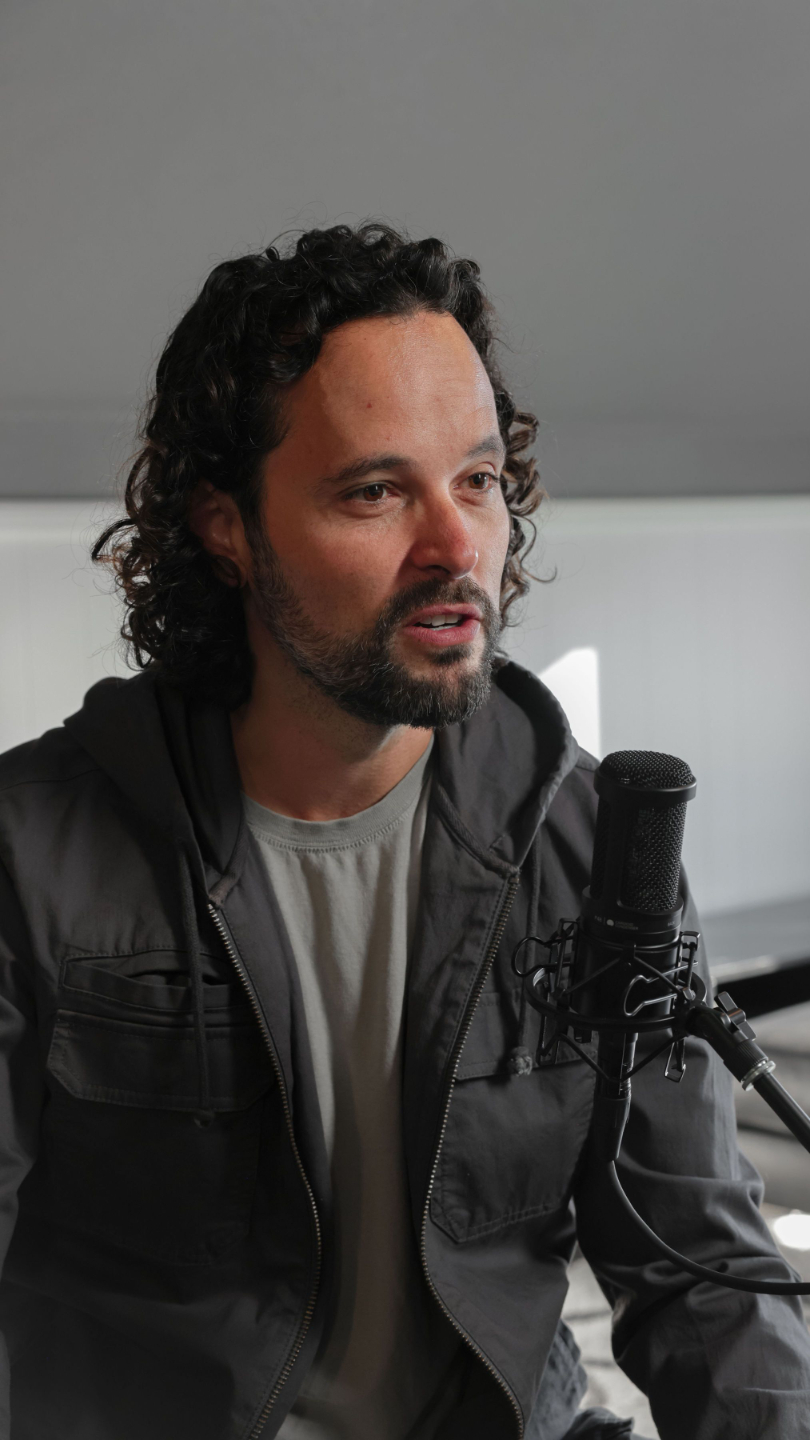How You Start Your Day Determines How You Show Up as a Husband
Introduction: Why Mornings Matter
You ever notice how your day starts before you even realize it? The alarm goes off, the phone lights up, and before you've even taken your first full breath, you're probably already reacting.
Your heart rate's up, your mind's racing, and suddenly you're sprinting into the day trying to catch up. Well, that was me for years. I'd roll out of bed already feeling behind. I'd scan emails, grab coffee, get the day going asap, and by the time I saw my wife, I had nothing left to give.
What I eventually learned is this, the way you start your day sets the tone for how you show up everywhere else. If you begin in chaos, you carry chaos. If you begin grounded, you carry steadiness into everything that follows. Your work, your marriage, your kids.
Today we're talking about how you start your morning. Not the productivity routines that business experts and influencers are pushing, but the kind that prepares your nervous system to lead well, to love well, and to stay connected through whatever the day brings. We'll talk about simple practices that calm your system, clear your head, and set you up to respond instead of react.
I'll share about what my mornings look like. We'll look at what real men I've coached and friends of mine are doing in their mornings. The common reasons we avoid it. And the science that proves that even a small routine can change the course of your day. Stick around. You might start looking at your mornings and yourself in a completely new way.
Welcome to Better Husband, the podcast that helps you answer the question, how can I be a better husband? I'm Angelo Santiago, a men's marriage and relationship coach, and every week I bring you practical insights to help you strengthen your marriage and become the best husband you can be.
Personal Story: From Chaos to Calm
There was a time in my life where every morning felt like a sprint. The alarm would go off and I'd launch myself out of bed before I was even fully awake. No pause, no breath, just motion. My feet hit the floor and my body was already braced for whatever was coming next. That pattern came straight out of my years as a firefighter. In that job, the sound of an alarm meant one thing, something was wrong.
The tone would drop, the room would light up, and everything in me would flip into go mode. You didn't get to wake up slowly, you reacted. It was adrenaline, speed and survival. And the problem is when you live that way for long enough, it becomes your default. Even when the danger is gone, your body doesn't know the difference.
It keeps waking up like there's still a fire to put out. So even after I left the department, that energy followed me home. I'd wake up already on edge scanning for what needed to be fixed or what might go wrong, and when you start the day bracing, it's only a matter of time before something feels like an attack.
I thought I was just being responsible, getting an early jump, staying on top of things, but underneath that, productivity was tension and it spilled out everywhere at work, in traffic and small moments at home that didn't need intensity but got it anyway. I can vividly remember so many mornings that started the same way.
Maybe I'd sleep a little later than usual because I was tired, but the moment I opened my eyes, I already felt behind. My wife would be with our son playing or having breakfast and asking me a simple question about our plans for the weekend. It should have been nothing. Just a normal, easy moment. But because I was still revving from the second I woke up, it felt like pressure.
I'd answered short, she'd pull back and just like that, the tone of the morning and the rest of the day would be set in that moment. What I also remember about those days is how they usually went. By the afternoon, I'd feel drained, distant, and frustrated without really knowing why. Nothing bad had happened.
No big fights, no crisis, but something always felt off. And over time I began to realize it all traced back to how my day began.
The Science Behind Morning Routines
When I stepped into learning more about my own personal and relational development, joining men's groups, attending retreats, studying psychology, and deepening my understanding of what it meant to be a better husband and leader, I was introduced to a new way of looking at this. I began to understand how much the way we start our day influences how we show up for everything else. So I started experimenting. At first, I just tried what other people were doing. Things I heard about in podcasts, YouTube videos or books.
Sometimes it worked, sometimes it didn't. I'd sit in silence for a minute before checking my phone. I'd drink water before coffee. I'd step outside and let the sunlight hit my face. It felt strange at first, almost unproductive, and that's exactly why it worked. I started to notice real change. I'd walk back inside calmer, and that energy carried into everything that followed.
Conversations felt easier. I wasn't rushing through breakfast or distracted when my wife spoke. It was like I finally had access to the part of myself that could choose how I wanted to show up. The contrast was undeniable. On the days I started grounded, I could handle stress without snapping. But on the days I skipped it, I felt the difference within minutes. My patience was gone. My focus scattered, and I was running on fumes by night.
It wasn't that my mornings became perfect, it was that I had finally stopped letting the day decide who I was going to be. I was deciding that for myself.
Practical Steps for a Grounded Morning
And that's what I want to talk to you about today. The quiet overlooked moments at the very start of your day that shape how everything else goes.
Because your morning isn't just about what time you wake up or drink your coffee, it's about setting the conditions that determine whether you show up. Reactive or relational. Scattered or steady. Guarded or open. When you start your day intentionally with calm, clarity and direction you give yourself and your marriage something rare, your full presence and that presence is what makes everything else work.
Now most men think of a morning routine as something you do to be productive, to get a head start and check more boxes. But what I've learned and what I've seen with the men I coach is that your morning routine is about preparation. It's getting you in the state you want to be for what's coming in your day.
When you wake up and rush straight into your phone, your inbox, your to-do list, you're letting the world decide who you're going to be and you hand your attention over before you've even centered yourself and the rest of your day mirrors that first decision. The way you begin your day is the way you train your nervous system to operate.
If you start in reactivity, you'll look for things to react to. If you start in calm, you'll move through the challenges with more steadiness. I've had men tell me they can't figure out why they're short-tempered with their wife or lose patience so quickly. Sometimes when we trace it back, we find the pattern.
They wake up already reacting. Stress before a single thing has gone wrong. Your morning routine is the first act of leadership you take every day. It's where you decide how you are going to show up for yourself, your family, your work, your marriage. I'm talking about creating space, even five minutes to regulate your body, clear your head and remind yourself who you want to be when the world starts asking for pieces of you.
It's not about doing more, it's about beginning your day intentionally.
When I ask men how they start their day, most of them shrug and they think about it for a little bit and say, well, I wake up, I make coffee. Sometimes I check emails. But when I ask them how they want to feel, the answer never matches their routine.
And when I ask, so what are you doing to create that feeling? Most of the time it's nothing. That's the disconnect. We wanna feel centered but start the day in chaos. We wanna feel connected, but never take a moment to connect with ourselves. So many of the men I've worked with who've made real changes in their marriage eventually come to the same realization.
It starts here. It's not the whole equation, but it's the foundation everything else rests on.
Real-Life Examples and Testimonials
Men that I've worked with have shared with me all kinds of way. They start their day and recently I reached out to a few close friends, men I trust men who I know begin their mornings with intention and I asked them what they do and how it makes them feel. Here are some of the things they shared.
Some start their mornings in silence, just breathing. No phone, no music, no noise. It's their time to slow down and connect with themselves before the day asks for their attention. Others begin with movement. One friend told me he heads to the gym first thing, and on the drive he spends a few minutes in gratitude and prayer.
He says it sets his focus before he even picks up a weight.
Another man shared that how he starts his day directly shapes how he shows up for his wife and kids. He's noticed that when he skips that intentional time, when he just rolls outta bed and starts reacting, everything feels heavier and everyone feels it.
And for me, I've had different seasons too. There were times I began my mornings in meditation with a candle and a few passages from a daily reader. Other seasons have been more physical, walking on a treadmill, going to the gym. Other times it's about listening to a guided meditation or some music while drinking water and setting an intention for the day.
Lately, I've added one more step. Taking a moment to think back to the day before and asking myself, am I holding onto any resentment? Is there someone I need to reconnect with? It's a small check-in that helps me clear whatever might be keeping me from showing up fully. All of these practices look different, but they serve the same purpose, starting the day from a grounded place. Because when you begin your morning with presence and direction, you don't have to chase it for the rest of the day.
The point is there's no single template. You don't need candles or cold plunges unless they serve you. You just need a rhythm that brings you back to yourself. Every man wakes up with something heavy. Work stress, relational tension, unfinished conversations. If you don't clear that weight before the day begins, you'll carry it into every interaction that follows.
It leaks into your tone, your patience, and your presence. Giving yourself that time isn't escaping responsibility. It's preparing for it. You're building a boundary between the noise of the world and the man you want to be. Whatever form it takes, Silence, movement, writing, prayer, sunlight. What matters is that you do something that grounds you, because if you don't, the world will do it for you, and it usually won't be kind about it.
Common Excuses and Overcoming Them
Now, when I talk to men about building a morning routine, there's one thing I always hear first: excuses. And I get it, i've used every one of them myself. I don't have time. I'm too tired. My mornings are already chaotic, or my personal favorite: i've tried that before and it didn't work.
And let's be honest, none of those are really about time, they're about belief. Most men don't believe a few minutes in the morning could actually change anything. They think the problems they face, the stress, the short temper, the distance in their marriage are too big to be shifted by something that small. But your mornings are where momentum begins. If you start your day reacting, you'll spend the rest of the day of it catching up.
If you start grounded, you carry that calm forward. You meet pressure, conflict, and conversations differently. When a man says to me that he doesn't have time, what he's really saying is, I haven't made space to lead myself. You don't need an hour. You just need a small window. Five minutes to breathe, 10 minutes to move, two to step outside and remember that the world is bigger than your inbox.
When a man says, I'm too tired, I'll ask, well, how are you sleeping? The answer is almost always not great, and that's not a coincidence. When you start your day in stress mode, your body stays in that gear until late at night, you fall asleep late, you wake up foggy and you repeat the cycle. You can't outwork a dysregulated nervous system.
You can only reset it, and that begins the moment you wake up.
Then there's the man who says, I've tried that before, and it didn't work. Usually that means he tried to copy someone else's version of a routine, a checklist that never fit his life. A morning routine has to fit your season. If you've got young kids, maybe it's 10 quiet minutes before the house wakes up.
If you travel for work, maybe it's stillness before you open your laptop. If you work shifts. Maybe it's at night instead of sunrise. The goal isn't a perfect system. It's a consistent space where you return to yourself and maybe the most honest excuse of all is this one.
I don't think it will make a difference. That's the belief that keeps most men stuck. If you've been living in stress or disconnection long enough, you forget what grounded even feels like. You get used to survival mode. You stop expecting calm, you stop expecting joy. You tell yourself this is just the way life is.
But it's not. The problem isn't that life is too stressful. It's that we keep trying to meet it with an unprepared nervous system. Your morning routine is your first act of care for yourself and for everyone who depends on you.
This is what it's really about, owning the first moments of your day, so the rest of it doesn't own you.
Now if you've been listening for a while, you know, I don't bring science into these conversations just to sound smart. I bring it in when the research backs up what real life has already proven.
And in this case, it does. What you do in the first few minutes after waking up has measurable effects on your focus, mood, and emotional regulation for the day. One study looked at wake up tasks, simple actions people did right after getting outta bed like a short stretch or writing down a thought or standing outside before checking their phone.
Those small actions created a carryover effect. People stayed more alert, intentional and positive throughout the day. It didn't matter what the task was, only that they did it. Another study tracked people's emotions during the first hour of the morning. The tone you set early, how you move, what you focus on.
Even your posture predicts how you'll feel for hours after. Start tense, and your body keeps that tension. Starts calm, and your system follows suit. Science keeps confirming this. Consistency creates stability. People with predictable daily routines report lower stress, better sleep, and a stronger sense of direction.
Not because routine is magical, but because it reduces the number of decisions you have to make under pressure. Less cognitive load, less emotional fatigue, more energy to show up where it matters.
One article from the World Economic Forum put it perfectly. Having consistent routines frees up mental energy for creativity and connection.
And if you think about it, that's exactly what, being a husband and father demands, creativity and connection. The ability to stay present when things don't go as planned, to adapt, to listen, to lead from calm instead of control.
Doing something in the morning is always better than doing nothing. It's less about which practice you choose and more about sending your nervous system a message that we're safe, we're steady, and we're ready.
If you don't give your system a direction, it defaults to stress. But if you said it intentionally, even for a few minutes, you tilt the entire day towards steadiness. And let's add to it because if you're married, which I imagine you are, if you're listening to this podcast, your morning routine doesn't shape you, it shapes the emotional tone of your home.
The mornings where you move slowly connect and share a quiet moment before the rush carry a different energy than the ones where you're both racing out the door, half talking, half distracted. And I've seen this play out over and over with my own marriage.
When I start creating a small ritual of connection before the day begins, even something as simple as a long hug, asking her how she's feeling about the day ahead and deep listening, everything else gets easier. The tension drops. The day feels more like a team effort instead of two people surviving side by side. For some couples, it's a few minutes on the couch before the kids wake up.
No phones, no talk about logistics. Just being near each other, letting your bodies catch up before the day starts pulling you apart. For others, it's prayer, a short reading or a morning walk. Sometimes it's just a hug that lasts long enough to actually feel it. Because if you don't make space for connection on purpose, you end up living in reaction, and that reaction builds distance fast.
You start moving through the day as coworkers instead of partners, managing tasks instead of tending to the relationship. Every couple has their own rhythm, but what matters is that you look at each other before you look at the world. When you connect first thing in the morning through touch, eye contact, or presence, you're co-regulating each other's nervous systems.
You're telling your body and hers that we're safe and we're together. It. That sense of safety helps both of you move through the day with more patience and trust.
So when you think about your morning routine, don't think of it just as self-care. Think of it as leadership. You are setting the rhythm for your home and the rhythm you choose, reactive or relational, is the one everyone else will move to.
You can't control the pace of the world outside, but you can create a different pace inside your home. That's how you lead as a husband, and it starts right here as the sun is rising and the day begins.
Now let's talk about one of the biggest mistakes I see men make over and over when it comes to their morning routine.
Adapting Your Routine to Life's Seasons
One of the biggest mistakes men make with routines is thinking that they have to find the perfect one. The truth is that what works for you today may not work for you a year from now. Your life has season, your marriage has seasons. Your energy and responsibilities change, and your morning routine should change with them.
I've gone through so many versions of mine over the year. There was a time I woke up before sunrise just to stand outside and feel the cold air on my face. Another season I was deep into meditation, 15 to 20 minutes every morning before I spoke to anyone. Then came a phase where the movement became everything.
Walking on the treadmill with music in my ears, waking my body up before the world came, rushing in. Each of those routines served a purpose. They helped me get what I needed at that time, and eventually they weren't having the same effect. Not because I was doing them wrong, but because I had changed.
That's what I want you to remember. Your morning practice isn't something to master, it's something to stay curious about. When it stops grounding you, don't abandon it, adjust it. Pay attention to what your life is asking for. Sometimes you need silence. Sometimes you need movement, sometimes connection, and sometimes just five quiet minutes to breathe before the day starts.
I see this same thing in marriage all the time. The things that worked early on, the routines, the gestures, the way you connected don't always work 10 years later. That doesn't mean the love is gone. It means the relationship is evolving. And the same goes for how you care for yourself. The point of a morning routine isn't to lock yourself into a rigid ritual, it's to keep finding ways to start your day grounded. To check in with yourself before you check in with the world.
So if your routine feels stale, that's not a sign to quit. It's a sign to explore. So if you wanna start building this into your life, don't overthink it. You don't need to plan out the next 30 years of your mornings. You just need to start leading yourself one day at a time.
Action Steps to Start Your Journey
Here are your action steps from this episode and where to begin. One, make a list of what grounds you. Think about the moments when you feel most calm, most centered, most yourself. Maybe it's breathing, walking, reading, praying, journaling, stretching, whatever helps you slow down enough to catch up with yourself. Write the list down.
Two, choose one to three practices. Pick a few that fit the season you're in and keep it simple. If you've got five minutes, use five minutes. If you've got 30, use 30. What matters is that you create a space that prepares you to lead the day, not chase it.
Three, commit to seven days. Tell yourself, I'm going to do this every morning for one week, not forever, just one week.
And as you go through the week, notice how it changes the way you feel, your mood, your focus, your patience, your connection with your wife. You'll start to see that even small acts of consistency begin to steady everything else.
Four reflect at the end of each day before you go to bed, ask yourself a simple question, how did my morning shape who I was today? That question alone builds awareness, and awareness is what leads to change.
And five, finally, at the end of the week, look back and see what worked, what didn't, what you want to keep doing. Then adjust and keep building, and if you feel like you're ready to commit to the next week with those adjustments.
Because once you experience what it feels like to start the day from calm instead of chaos, you won't want to go back. Your morning Doesn't have to be long or complicated. It just has to be yours.
Reflection Questions and Final Thoughts
Now, here are some reflection questions for you to think on or journal on.
Take a few minutes this week to sit with these questions. Don't rush them. Let them work on you.
How does the way I start my day affect how I show up with my wife and my family?
What energy do I usually bring into the morning? Calm and clarity or stress and reaction?
What's one small change I can make tomorrow morning that would help me begin the day more grounded?
Which of my current habits drain me before the day even starts?
What would it look like to wake up each day already aligned with the man I want to be.
Here's what I want you to walk away with from this episode.
Your morning routine is about direction. It's about deciding who you're going to be before the world decides for you. You don't need to overhaul your life to start this work. You just need to begin your day with intention because every morning gives you a choice. To react or to lead. To rush into the noise or to create space for clarity. To start from chaos or to start from calm.
When you choose calm, you give yourself the gift of perspective. You think more clearly, you speak more carefully, you love more openly, and those small shifts ripple outwards into your marriage, your home, your work, everywhere. So tomorrow morning before you reach for your phone or start running through your list, pause, take one full deep breath.
Remember who you want to be and let that version of you start the day. That's where leadership begins. That's where presence is built. That's where better husbands are made.
Workshop Invitation and Closing Remarks
If you liked what you heard in this episode and you want to go deeper into this kind of work, the habits, the mindset, and the daily practices that actually help you become a better husband, then join me for the Three Secrets to Becoming a Better Husband Workshop.
It's where I break down the core relational skills that every man needs to lead with calm, clarity and connection. You'll also learn more about Better Husband Academy, where we go through four levels of this work together, layer by layer. What we talked about today, building habits and morning routines that set you up to lead from your best self, that's part of level four of the academy. Before we even get there, we spend time laying the foundation, learning how to stay grounded, communicate clearly, and repair connection when things get off track.
So if you're ready to start that journey, go to betterhusbandsecrets.com or click the link in the show notes.
That's where it all begins.
I just wanna say thank you for listening and being on this journey and becoming a better husband. I'm Angelo Santiago. You're listening to Better Husband, and I'll see you on the next one.







